
Cultural Studies of Science Education
Scope & Guideline
Shaping Future Scholars at the Intersection of Culture and Science
Introduction
Aims and Scopes
- Culturally Responsive Pedagogy:
The journal emphasizes the importance of culturally responsive and sustaining pedagogies in science education, exploring how educators can tailor their teaching methods to reflect and respect the cultural backgrounds of their students. - Social Justice and Equity:
A core focus is on social justice in science education, advocating for equitable access to science learning for marginalized communities and addressing systemic inequalities within educational practices. - Interdisciplinary Approaches:
The journal promotes interdisciplinary methodologies that integrate insights from various fields such as sociology, anthropology, and education to understand and improve science education practices. - Critical Pedagogy:
It engages with critical pedagogical frameworks, encouraging educators to challenge traditional power dynamics in the classroom and to foster critical thinking and agency among students. - Community and Place-Based Learning:
There is a strong emphasis on the role of community and place in science education, highlighting the significance of local contexts and experiences in shaping scientific knowledge and understanding. - Identity and Belonging:
The journal explores the role of identity in science education, particularly how students' cultural, racial, and gender identities influence their engagement and participation in science.
Trending and Emerging
- Integration of Indigenous Knowledge:
There is a growing emphasis on integrating Indigenous knowledge systems and perspectives into science education, highlighting the importance of cultural relevance and respect for diverse epistemologies. - Climate Change and Environmental Justice:
Research focusing on climate change education and environmental justice has seen an uptick, reflecting urgent global concerns and the role of education in fostering awareness and action. - Emotional and Social Dimensions of Learning:
Emerging themes explore the emotional and social dimensions of learning, particularly how emotions influence engagement and identity in science education, signaling a shift towards holistic educational practices. - Critical Examination of STEM Fields:
There is an increasing trend towards critically examining STEM fields, particularly regarding issues of representation, equity, and the impact of neoliberal ideologies on science education. - Digital Pedagogy and Technology Integration:
The integration of digital pedagogy and technology in science education is becoming more prominent, especially in the context of remote learning and the need for innovative teaching strategies. - Youth Activism and Science Education:
Recent publications highlight the role of youth activism in science education, emphasizing how students can engage in sociopolitical issues through scientific inquiry and education.
Declining or Waning
- Traditional Science Education Methods:
There is a noticeable decline in articles focusing solely on traditional science education methods, indicating a shift towards more innovative and culturally relevant approaches. - Isolation of Science Education from Broader Contexts:
Themes that treat science education as an isolated discipline without consideration of cultural, social, and political contexts are appearing less frequently, suggesting a growing recognition of the need for integrated approaches. - Narrow Definitions of Scientific Literacy:
Discussions centered around narrow or conventional definitions of scientific literacy are diminishing, as the field increasingly embraces broader, more inclusive understandings of what it means to be scientifically literate.
Similar Journals

Multicultural Education Review
Championing Cultural Awareness in Academic DiscourseWelcome to the Multicultural Education Review, an esteemed academic journal published by ROUTLEDGE JOURNALS, TAYLOR & FRANCIS LTD. As a prominent resource in the fields of Anthropology and Education, this journal aims to foster the understanding of multicultural perspectives in educational practices. With a robust impact factor and recognition in the Q1 and Q2 quartiles across its categories, the journal offers a vital platform for researchers, educators, and students to share innovative studies and discussions related to multicultural education. Though operating under a subscription model, the journal's content is pivotal for advancing scholarship and dialogue in diverse educational contexts. Since its inception in 2009, the journal continues to shape the discourse on inclusivity, equity, and cultural diversity, ensuring eligibility for a broad readership keen on addressing contemporary educational challenges.

Changing English-Studies in Culture and Education
Exploring the Nexus of Culture and Education.Changing English-Studies in Culture and Education is a leading academic journal published by Routledge Journals, Taylor & Francis Ltd, dedicated to exploring the dynamic intersections of cultural studies and educational practices. With an ISSN of 1358-684X and an e-ISSN of 1469-3585, this journal has maintained notable credibility in the academic community, as evidenced by its impressive rankings—Q1 in Cultural Studies and Q2 in Education for 2023. Spanning from 1994 to 2024, it has become a vital resource for researchers and educators seeking to engage with the evolving narratives of English studies within diverse cultural contexts. The journal aims to illuminate innovative pedagogical approaches and offer critical insights into the cultural implications of language and literature in education. As part of the vibrant scholarly landscape, its contributions play a crucial role in bridging theory and practice, ultimately enriching both academic discourse and educational frameworks.
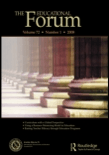
EDUCATIONAL FORUM
Connecting Scholars to Transform Educational LandscapesEDUCATIONAL FORUM, published by Routledge Journals, Taylor & Francis Ltd, is a premier academic journal that serves as a vital platform for innovative research and discourse in the field of education. With an ISSN of 0013-1725 and an E-ISSN of 1938-8098, this journal has been at the forefront of educational scholarship since its inception in 1936, continuing to disseminate critical insights through 2024. Recognized in the Q2 category of education in 2023, it holds a Scopus rank of 768 out of 1543 in the social sciences, placing it in the 50th percentile overall. Though it does not offer open access, the journal provides an essential resource for researchers, professionals, and students aiming to expand their understanding of current educational practices, policies, and innovations. By fostering an academic environment rich in rigorous analysis and thoughtful discussion, EDUCATIONAL FORUM plays an indispensable role in shaping the future of education.
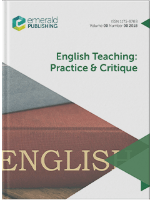
English Teaching-Practice and Critique
Cultivating Knowledge and Innovation in English EducationEnglish Teaching-Practice and Critique is an esteemed journal published by Emerald Group Publishing Ltd, focusing on the interdisciplinary fields of Education and Linguistics. With a commitment to advancing knowledge and practice in English language teaching, the journal offers a platform for innovative research, critical reflections, and practical insights that are vital for educators, researchers, and students alike. The journal has established itself in the academic community, achieving a Q3 ranking in Education and a prestigious Q1 ranking in Linguistics and Language as of 2023, highlighting its impact and relevance. Although not an open-access journal, its curated content remains accessible to a global audience, facilitating meaningful discourse and development in English language education. The journal spans articles from 2008 to 2014 and 2016 to 2024, making it a valuable resource for ongoing scholarly dialogue and pedagogical advancement. It is particularly recognized within Scopus rankings, standing at the 76th percentile in Arts and Humanities as well as the 74th percentile in Social Sciences, underscoring its significance and standing in these domains.
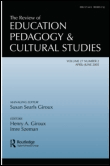
Review of Education Pedagogy and Cultural Studies
Unpacking the Intersections of Pedagogy and SocietyReview of Education Pedagogy and Cultural Studies, published by ROUTLEDGE JOURNALS, TAYLOR & FRANCIS LTD, is a leading academic journal that spans critical themes in the fields of education and cultural studies. With an ISSN of 1071-4413 and an E-ISSN of 1556-3022, this quarterly publication showcases groundbreaking research, theoretical frameworks, and innovative pedagogical practices, making it an invaluable resource for scholars, educators, and policymakers alike. Hailing from the United Kingdom and set to converge from 1994 to 2024, the journal has gained recognition with impressive rankings—occupying Q1 in Cultural Studies and Q2 in Education as of 2023. Notably, it ranks #196 in Cultural Studies and #847 in Education according to Scopus, highlighting its significant influence in shaping contemporary discourse and research. Engaging with contemporary challenges, the journal aims to bridge theoretical insights and practical implementation, thereby contributing to the advancement of educational practices informed by cultural contexts. As an essential platform for debate and dissemination of knowledge, Review of Education Pedagogy and Cultural Studies welcomes contributions that explore the intersections of education and culture, fostering a deeper understanding of their impact on society.

Actualidades Pedagogicas
Exploring Innovative Pedagogies for a Brighter FutureActualidades Pedagogicas is a prestigious academic journal published by UNIV LA SALLE, dedicated to exploring the dynamic field of education and pedagogy. With its ISSN 0120-1700 and E-ISSN 2389-8755, this journal serves as a vital resource for researchers, educators, and students interested in innovative teaching practices, educational theory, and policy analysis. While the journal presently maintains a traditional access model, it aims to foster open dialogue and knowledge sharing among professionals in the educational field. Located in Cundinamarca, Bogotá, Colombia, Actualidades Pedagogicas is committed to enhancing the quality of education through rigorous research and impactful discussions. By contributing to the advancement of pedagogical frameworks and methodologies, this journal plays a crucial role in shaping the future of education.
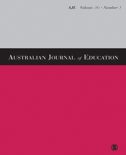
AUSTRALIAN JOURNAL OF EDUCATION
Illuminating Diverse Perspectives in Educational IssuesThe Australian Journal of Education, published by SAGE Publications Ltd, is a renowned platform dedicated to advancing scholarly discourse in the field of education. With an ISSN of 0004-9441 and an E-ISSN of 2050-5884, this journal is widely recognized for its rigorous peer-reviewed articles that contribute to theoretical and practical advancements in educational research. As of 2023, it holds a commendable Q2 quartile ranking in the field of Education, reflecting its significant impact within the academic community, with a Scopus rank of #491 out of 1543 in the Social Sciences - Education category, placing it in the 68th percentile. The journal seeks to explore diverse educational issues ranging from policy analysis to pedagogical innovations, making it an invaluable resource for researchers, professionals, and students alike who are committed to enhancing educational practices and outcomes. With issues published regularly from 1992 to 2024, the Australian Journal of Education remains a cornerstone for those engaged in critical discussions surrounding educational theory and applications.
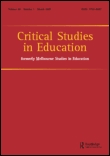
Critical Studies in Education
Pioneering research that redefines education.Critical Studies in Education, published by Routledge Journals, Taylor & Francis Ltd, is a leading journal in the field of education, with a distinguished Q1 ranking in the 2023 category quartiles. This esteemed journal, accessible to scholars in the United Kingdom and internationally, showcases cutting-edge research and critical perspectives on educational practices, theories, and policies, addressing the complex dynamics shaping contemporary education. With an impressive Scopus rank of #51 out of 1543 within the Social Sciences Education category, it places itself in the 96th percentile, underscoring its significant impact within the academic community. Researchers, educators, and students will find in-depth articles that challenge conventional thought and promote innovative approaches to learning and pedagogy, ensuring that Critical Studies in Education remains an essential resource for those dedicated to advancing educational scholarship and practice from 2008 through to 2024.

Australian Journal of Language and Literacy
Fostering excellence in language acquisition and literacy development.The Australian Journal of Language and Literacy, published by SpringerNature, is an esteemed platform for advancing research in the fields of linguistics, language, and education. With an ISSN of 1038-1562 and an E-ISSN of 1839-4728, this journal has been a crucial resource since its inception in 1997, now converging into its 2024 volume. It proudly holds a significant position within the Q2 category in Linguistics and Language and a Q3 classification in Education for 2023, reflecting its commitment to high-quality scholarly content. With impressive Scopus rankings in arts and humanities and education, it engages a diverse audience of researchers, educators, and linguists. Although this journal is not open access, it remains an essential resource for those seeking to enhance their understanding of language acquisition, literacy development, and pedagogical approaches. By contributing to the discourse in these vital areas, the Australian Journal of Language and Literacy plays a pivotal role in shaping the educational landscape in Australia and beyond.

In Education
Shaping the future of education through scholarly exchange.In Education is a prestigious open-access journal published by the Faculty of Education at the University of Regina, dedicated to advancing research in the field of education. With its ISSN 1927-6117, the journal has been a vital platform for scholarly work since 2009, providing a significant avenue for educators, researchers, and practitioners to share innovative ideas and research findings. Committed to fostering a rich dialogue on educational practices and policies, In Education publishes a diverse range of articles that cover theoretical and empirical research, ensuring a comprehensive exploration of contemporary educational issues. By encouraging open access, the journal promotes widespread dissemination of knowledge, facilitating greater accessibility for students and professionals alike. As a contributor to the evolving landscape of educational research, In Education serves as an essential resource for those aiming to transform educational practices through informed, evidence-based insights.